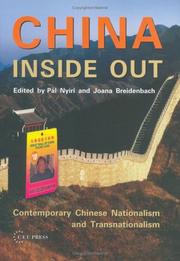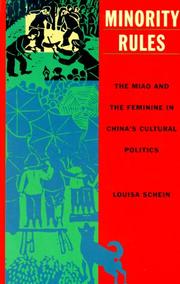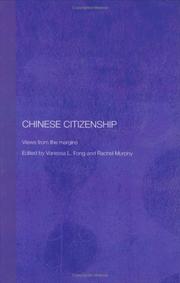| Listing 1 - 10 of 19 | << page >> |
Sort by
|
Book
ISBN: 9780520272743 0520272749 Year: 2012 Publisher: Berkeley University of California press
Abstract | Keywords | Export | Availability | Bookmark
 Loading...
Loading...Choose an application
- Reference Manager
- EndNote
- RefWorks (Direct export to RefWorks)
Ethnology --- Ethnicity --- Minorities --- History --- Government policy --- China --- Population. --- S06/0240 --- S11/1215 --- China: Politics and government--Policy towards minorities and autonomous regions --- China: Social sciences--Works on national minorities and special groups: since 1949

ISBN: 0520021029 Year: 1973 Publisher: Berkeley : University of California Press,
Abstract | Keywords | Export | Availability | Bookmark
 Loading...
Loading...Choose an application
- Reference Manager
- EndNote
- RefWorks (Direct export to RefWorks)
Minorities --- Minorités --- S06/0240 --- S11/1215 --- -#SML: Joseph Spae --- Ethnic minorities --- Foreign population --- Minority groups --- Persons --- Assimilation (Sociology) --- Discrimination --- Ethnic relations --- Majorities --- Plebiscite --- Race relations --- Segregation --- China: Politics and government--Policy towards minorities and autonomous regions --- China: Social sciences--Works on national minorities and special groups: since 1949 --- Minorités --- #SML: Joseph Spae
Book
ISBN: 0674119649 Year: 1976 Volume: 87 Publisher: Cambridge, Mass. : Harvard University Press,
Abstract | Keywords | Export | Availability | Bookmark
 Loading...
Loading...Choose an application
- Reference Manager
- EndNote
- RefWorks (Direct export to RefWorks)
Minorities --- Minorités --- S11/1215 --- S06/0240 --- -#SML: Joseph Spae --- Ethnic minorities --- Foreign population --- Minority groups --- Persons --- Assimilation (Sociology) --- Discrimination --- Ethnic relations --- Majorities --- Plebiscite --- Race relations --- Segregation --- China: Social sciences--Works on national minorities and special groups: since 1949 --- China: Politics and government--Policy towards minorities and autonomous regions --- Minorités --- #SML: Joseph Spae

ISBN: 9786155053962 6155053960 2821815034 1281268763 9786611268763 1423718208 9781423718208 9781281268761 9789639241954 9639241954 9789637326141 9637326146 9782821815032 6611268766 Year: 2005 Publisher: Budapest, Hungary ; New York, N.Y. : Central European University Press,
Abstract | Keywords | Export | Availability | Bookmark
 Loading...
Loading...Choose an application
- Reference Manager
- EndNote
- RefWorks (Direct export to RefWorks)
The "war on terror" has generated a scramble for expertise on Islamic or Asian "culture" and revived support for area studies, but it has done so at the cost of reviving the kinds of dangerous generalizations that area studies have rightly been accused of. This book provides a much-needed perspective on area studies, a perspective that is attentive to both manifestations of "traditional culture" and the new global relationships in which they are being played out. The authors shake off the shackles of the orientalist legacy but retain a close reading of local processes. They challenge the boundaries of China and question its study from different perspectives, but believe that area studies have a role to play if their geographies are studied according to certain common problems.In the case of China, the book shows the diverse array of critical but solidly grounded research approaches that can be used in studying a society. Its approach neither trivializes nor dismisses the elusive effects of culture, and it pays attention to both the state and the multiplicity of voices that challenge it.
Nationalism --- China --- Foreign relations --- S02/0200 --- S06/0240 --- S11/1100 --- China: General works--Civilization and culture --- China: Politics and government--Policy towards minorities and autonomous regions --- China: Social sciences--Immigration and emigration, Overseas Chinese (huaqiao) --- 21st century, China, Empires, Foreign relations, Modernity, Nationalism, Racism Russia.
Book
ISSN: 03056252 ISBN: 1897693249 Year: 2001 Publisher: London Minority Rights Group
Abstract | Keywords | Export | Availability | Bookmark
 Loading...
Loading...Choose an application
- Reference Manager
- EndNote
- RefWorks (Direct export to RefWorks)
S06/0439 --- S06/0240 --- S11/1215 --- China: Politics and government--Policy towards religion --- China: Politics and government--Policy towards minorities and autonomous regions --- China: Social sciences--Works on national minorities and special groups: since 1949 --- Sociology of minorities --- Sociology of religion --- Human rights --- China

ISBN: 082232444X 0822324083 0822397315 1322141223 Year: 2000 Publisher: Durham (N.C.) : Duke university press,
Abstract | Keywords | Export | Availability | Bookmark
 Loading...
Loading...Choose an application
- Reference Manager
- EndNote
- RefWorks (Direct export to RefWorks)
Minority Rules is an ethnography of a Chinese people known as the Miao, a group long consigned to the remote highlands and considered backward by other Chinese. Now the nation’s fifth largest minority, the Miao number nearly eight million people speaking various dialects and spread out over seven provinces. In a theoretically innovative work that combines methods from both anthropology and cultural studies, Louisa Schein examines the ways Miao ethnicity is constructed and reworked by the state, by non-state elites, and by the Miao themselves, all in the context of China’s postsocialist reforms and its increasing exchange and fascination with the West. She offers eloquently argued interventions into debates over nationalism, ethnic subjectivity, and the ethnography of the state.Posing questions about gender, cultural politics, and identity, Schein examines how non-Miao people help to create Miao ethnicity by depicting them as both feminized keepers of Chinese tradition and as exotic others against which dominant groups can assert their own modernity. In representing and consuming aspects of their own culture, Miao distance themselves from the idea that they are less than modern. Thus, Schein explains, everyday practices, village rituals, journalistic encounters, and tourism events are not just moments of cultural production but also performances of modernity through which others are made primitive. Schein finds that these moments frequently highlight internal differences among the Miao and demonstrates how not only minorities but more generally peasants and women offer a valuable key to understanding China as it renegotiates its place in the global order.
Hmong (Asian people) --- Ethnic relations --- Hmong (Peuple d'Asie) --- Relations interethniques --- Social life and customs. --- Political aspects. --- Moeurs et coutumes --- Aspect politique --- S11/1224 --- S06/0240 --- China: Social sciences--Miao --- China: Politics and government--Policy towards minorities and autonomous regions --- Hmoob (Asian people) --- Hmu (Asian people) --- Hmung (Asian people) --- Humung (Asian people) --- Meo (Southeast Asian people) --- Miao people --- Moob (Asian people) --- Ethnology --- Ethnic politics --- Political aspects --- Social life and customs
Book
ISBN: 9782070131150 2070131157 Year: 2010 Publisher: Paris: Gallimard,
Abstract | Keywords | Export | Availability | Bookmark
 Loading...
Loading...Choose an application
- Reference Manager
- EndNote
- RefWorks (Direct export to RefWorks)
Ces vingt-trois témoignages permettent à des hommes et des femmes, agents ou victimes de la révolution, d'aborder la question du Tibet et de montrer comment cette culture s'est forgée au fil des siècles
Revolutions --- Révolutions --- China --- Tibet Autonomous Region (China) --- Chine --- Région autonome du Tibet (Chine) --- History --- Politics and government --- Histoire --- Politique et gouvernement --- S24/0500 --- S06/0240 --- S06/0435 --- Tibet--History (incl. Relations with China and England) --- China: Politics and government--Policy towards minorities and autonomous regions --- China: Politics and government--Cultural Revolution --- Région autonome du Tibet (Chine) --- 1951 --- -Récits personnels --- -Histoire --- 1966-1976 (Révolution culturelle) --- Région autonome du Tibet (Chine) - Histoire - 1951 --- -Région autonome du Tibet (Chine) - Récits personnels - Histoire - 1951 --- -China - Histoire - 1966-1976 (Révolution culturelle) --- -Région autonome du Tibet (Chine) - Histoire - 1951- - Récits personnels --- Chine - Histoire - 1966-1976 (Révolution culturelle)
Book
ISBN: 0295973803 0295975288 0295804084 9780295804088 9780295975283 Year: 1995 Volume: *1 Publisher: University of Washington Press
Abstract | Keywords | Export | Availability | Bookmark
 Loading...
Loading...Choose an application
- Reference Manager
- EndNote
- RefWorks (Direct export to RefWorks)
A civilizing project, as described in this book, is a kind of interaction between peoples, in which one group, the civilizing center, interacts with other groups (the peripheral peoples) in terms of a particular kind of inequality. In this interaction, the inequality between the civilizing center and the peripheral peoples has its ideological basis in the center's claim to a superior degree of civilization, along with a commitment to raise the peripheral peoples' civilization to the level of the center, or at least closer to that level.
Ethnicity --- Acculturation --- Ethnicité --- Social life and customs --- Moeurs et coutumes --- China --- Chine --- Ethnic relations --- Relations interethniques --- Ethnicité --- S06/0240 --- S11/1223 --- S11/1224 --- S11/1225 --- S11/1230 --- S11/1226 --- -844.1 Minderheden --- -845 Religie --- China: Politics and government--Policy towards minorities and autonomous regions --- China: Social sciences--Noso, Naxi --- China: Social sciences--Miao --- China: Social sciences--Yao --- China: Social sciences--Others --- China: Social sciences--Zhuang-Tai --- Sociology of minorities --- 811 Filosofie --- 812 Ideologie --- 815 Geschiedenis --- 821.1 Volkenrecht --- 826 Imperialisme, Kolonialisme --- 841.5 Bestuur en beleid --- 841 Politiek Bestel --- 844.1 Minderheden --- 845 Religie --- 846.2 Racisme --- 846 Identiteit --- 847 Onderwijs --- 860 (Vredes)cultuur --- 883.2 Oost-Azië --- Ethnic identity --- Group identity --- Cultural fusion --- Multiculturalism --- Cultural pluralism --- Culture contact --- Development education --- Civilization --- Culture --- Ethnology --- Assimilation (Sociology) --- Ethnic relations. --- Social life and customs. --- Culture contact (Acculturation) --- Social & cultural anthropology
Book
ISBN: 0333594886 Year: 1993 Publisher: Basingstoke Macmillan
Abstract | Keywords | Export | Availability | Bookmark
 Loading...
Loading...Choose an application
- Reference Manager
- EndNote
- RefWorks (Direct export to RefWorks)
S06/0200 --- S06/0223 --- S06/0220 --- S06/0436 --- S06/0438 --- S06/0240 --- S10/0251 --- S14/0454 --- S07/0370 --- S08/0350 --- S20/0500 --- S21/0500 --- China: Politics and government--Government and political institutions: general and before 1911 --- China: Politics and government--People's Republic: general: since 1976 --- China: Politics and government--People's Republic: general --- China: Politics and government--Policy towards literature and art --- China: Politics and government--Policy towards press, Internet --- China: Politics and government--Policy towards minorities and autonomous regions --- China: Economics, industry and commerce--General works and economic history: since 1989 --- China: Education--Education: since 1989 --- China: Army and police force--Military institutions --- China: Law and legislation--General works and codices: since 1949 --- China: Agriculture forestry, fishery, natural disasters--Environmental policy, pollution --- China: Medicine, public health and food--Public health, hospitals, medical schools, etc. --- China: Medicine, public health and food--Public health, hospitals, medical schools, etc

ISBN: 0415371457 Year: 2005 Publisher: London ; New York : Routledge,
Abstract | Keywords | Export | Availability | Bookmark
 Loading...
Loading...Choose an application
- Reference Manager
- EndNote
- RefWorks (Direct export to RefWorks)
Marginality, Social --- Citizenship --- People with social disabilities --- Marginalité --- Citoyenneté --- Education civique --- Handicapés sociaux --- Study and teaching --- Government policy --- Politique gouvernementale --- S14/0454 --- S14/0800 --- S06/0240 --- S06/0255 --- China: Education--Education: since 1989 --- China: Education--Teaching methods --- China: Politics and government--Policy towards minorities and autonomous regions --- China: Politics and government--Political theory: modern (and/or under Western influence) --- S02/0200 --- S06/0260 --- Exclusion, Social --- Marginal peoples --- Social exclusion --- Social marginality --- Assimilation (Sociology) --- Culture conflict --- Social isolation --- Sociology --- Birthright citizenship --- Citizenship (International law) --- National citizenship --- Nationality (Citizenship) --- Political science --- Public law --- Allegiance --- Civics --- Domicile --- Political rights --- Culturally deprived people --- Culturally disadvantaged people --- Disadvantaged people, Culturally --- Disadvantaged people, Socially --- People with cultural disabilities --- Socially disadvantaged people --- Socially handicapped --- Underprivileged people --- People with disabilities --- China: General works--Civilization and culture --- China: Politics and government--The Chinese model --- Law and legislation --- MARGINALITE SOCIALE --- CITOYENNETE --- HANDICAPES --- CHINE --- ETUDE ET ENSEIGNEMENT --- POLITIQUE ET GOUVERNEMENT
| Listing 1 - 10 of 19 | << page >> |
Sort by
|

 Search
Search Feedback
Feedback About UniCat
About UniCat  Help
Help News
News